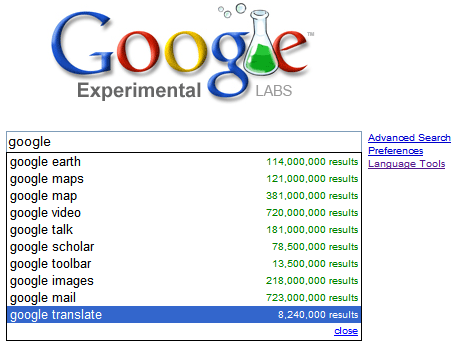
If you like Google Suggest, the feature that auto-completes your queries based on Google's aggregated data, you can now add it to the standard search pages by joining the keyword suggestions experiment, one of the five experiments from the search section of Google Labs.
As you type into the search box, Google Suggest guesses what you're typing and offers suggestions in real time. This is similar to Google's "Did you mean?" feature that offers alternative spellings for your query after you search, except that it works in real time. For example, if you type "bass," Google Suggest might offer a list of refinements that include "bass fishing" or "bass guitar." Similarly, if you type in only part of a word, like "prog," Google Suggest might offer you refinements like "programming," "programming languages," "progesterone," or "progressive." You can choose one by scrolling up or down the list with the arrow keys or mouse.
Google Suggest is also available by adding &complete=1 to a Google search URL (e.g.: [Google]), in Firefox's search box and in Google Toolbar. Some Asian versions of Google show keyword suggestions by default: China, Korea, India.
This year both Ask.com and Yahoo introduced these suggestions as a built-in component of the search experience, hoping to guide users when typing a query. Yahoo's search assistant shows up as an extension of the search box if you type some letters from a word and then stop for a couple of seconds. Even if you can disable it, many people found it annoying and unnecessary. "Get rid of any of the so-called assistants. They take up space on the screen, slow down processes and insult everyone's [intelligence]." is just an example of negative feedback.

Sometimes search suggestions save you time and help you enter difficult words like deoxyribonucleic, in other cases the suggested query contains the answer to your question. But are they useful and good enough to bring them to Google's search pages?